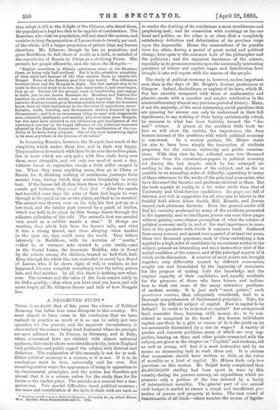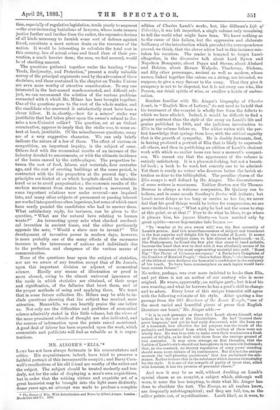A NEGLECTED STUDY.*
THERE is no doubt that of late years the science of Political Economy has fallen into some disrepute in this country. We seem almost to have come to the conclusion that we have realised in practice as much of it as can be safely put into operation for the present, and the apparent inconsistency is observableof the science being least honoured where its precepts are most adhered to. In France, in Germany, and in Italy, where economical laws are violated with almost universal applause, their study shows considerable activity, bat in England both publicists and public regard the subject with distrust and disfavour. The explanation of this anomaly is not far to seek. Either political economy is a science, or it is not. If it is, its conclusions mast be true, universally and for ever. But recent legislation wears the appearance of being in opposition to its fundamental principles, and the notion has therefore got abroad that it is a science rather for the study than for the foruni or the market.place. The mistake is a natural but a dan- gerous one. Two special difficulties beset political economy ; the mass and complication of the facts it deals with are such as • Problem, and Exercises in Political B.Ionomm. Coleeled, &e., by Alfred MUnes, M.A.. London: Swan Sonnenschein and Co. 1882. to render the drafting of its conclusions a most troublesome and perplexing task ; and its connection with sociology on the one hand and politics on the other is so close, that a completely satisfactory definition and delimitation of its province verge upon the impossible. Hence the enunciations of its pundits have too often, during a period of great social and political change, been open to the comment both of the philosopher and the politician ; and the apparent harshness of the science, especially in its pronouncements upon the universally interesting questions of labour and capital, wages and distribution, have brought it into evil repute with the masses of the people.
The study of political economy is, however, no less important now, than in the days of Mr. Bright's famous predecessor at Glasgow. Indeed, disobedience or neglect of its laws, which M. Say has recently compared with those of mathematics and physics, meets with a speedier and ampler retribution in the nineteenth century than at any previous period of history. Many, if not the majority, of the most interesting social questions that are pressing for answer can only be understood in their full significance, to say nothing of their being satisfactorily solved, by recourse to what has been foolishly termed the " dis- mal " science. A glance at the excellent little book be- fore us will show the variety, the importance, the deep human interest of the problems with which political economy
is concerned. In a modest preface, Mr. Milnes states his aim to have been simply the instruction of students preparing for the various university and public examina- tions. With that view he has collected some two thousand questions from the examination-papers in political economy set during the last decade, which he has arranged ac- cording to the main divisions of the subject, and as far as possible in an ascending order of difficulty, appending to many of them references to the works of the principal economists who have discussed the theories and problems involved in them. But the book appeals in reality to a far wider circle than that of University and Civil-Service candidates. Its pages are full of interest, and rich in suggestion for all who care to labour in the fruitful field where Adam Smith, Mill, Ricardo, and Jevons reaped such plenteous harvests. Even the general reader will find his curiosity awakened by many of the problems presented to his ingenuity, and no intelligent person can scan these pages without gaining some clearer perception of what the science of political economy really is, and of the vast importance to man- kind of the questions with which it concerns itself. Gathered from many sources, and spread over a period of at least ten years, these two thousand questions, each of them embodying a test applied to a high order of candidates by an eminent worker in the subject, present an interesting and most instructive view of the actual condition of the science, and of the principal aspects of it which excite discussion. A number of moot points are brought together, very differently treated by different economists, sought out and formulated by the ingenuity of examiners for the purpose of testing both the knowledge and the original capacity of their candidates, and equally available for the purposes of those who have leisure and inclina- tion to work out some of the many attractive problems of modern society. It is just such "moot points," such pmetiones vexatae, that, adequately considered, lead to a thorough comprehension of fundamental principles. Take, for instance, the difficult subject of capital. How is capital to be defined ? Is credit to be reckoned as capital? Are unimproved land, muscular force, learning, skill, money, do., to be con- sidered as comprised in the term? Are human individuals capital, can there be a glut or excess of it, is the profit on its use necessarily diminished by a rise in wages ? A variety of queries and concrete problems, many of which are very sug- gestive, bearing on these and other points connected with the subject, are given in the chapter on "Capital," and students, old as well as young, will find it a most instructive and by no means an unamusing task to work them out. It is curious that economists should have written so little on the value of morality as a kind of capital. Mr. Milnes finds only two questions on this matter. Mr. Bright lately complained that £4,400,000,000 sterling had been spent in wars by this country daring the present century, an expenditure which re- presents only a portion of the loss induced by a laxity of international morality. The greater part of our annual civil budget is needed to ensure a rough and insufficient pro- tection of person and property at home. The vast crowd of functionaries of all kinds—whose number the course of legisla-
tion, especially of regulative legislation, tends yearly to augment —the ever-increasing battalions of lawyers, whose costs remove Justice further and further from the suitor, the expensive devices of all kinds necessary to furnish some sort of defence against fraud, constitute a most serious drain on the resources of the nation. It would be interesting to calculate the total cost in this country, less of actual crime and fraud than of their pre- vention, a much heavier item; the sum, we feel assured, would be of startling amount.
The questions gathered together under the heading "Free Trade, Reciprocity, and Protection," present a really valuable survey of the principal arguments used by the advocates of these doctrines, and those contained in the chapter on Trades Unions are even more worthy of attentive consideration. To any one interested in the last-named mach-contested, and difficult sub- ject, we can recommend the solution of the various problems connected with it which Mr. Mines has here brought together. One of the questions goes to the root of the whole matter, and the candidate who answered it satisfactorily must have been a clever fellow. It is, shortly,—how far a miners' strike was justifiable that had taken place upon the owner's refusal to dis- miss a non-Unionist collier P The question, set at an Oxford examination, appears to imply that the strike was, to some ex- tent at least, justifiable. Of the miscellaneous questions, many are of a very suggestive character. We can only briefly indicate the nature of a few of them. The effect of custom on competition, an important inquiry, is the subject of some. Others deal with the economical results of an increase of the industry devoted to amusements, or with the ultimate incidence of the losses caused by the cattle-plague. The proportion be. tween the cost of food, labour, and materials, four centuries ago, and the cost of erecting buildings at the same period, is contrasted with the like proportion at the present day ; the principles are hinted at on which hospitals should be adminis- tered so as to avoid pauperisation; the economic results of the modern movement from status to contract—a movement in some important relations now under reversal—are inquired into, and many other subjects of permanent or passing interest are worked into questions often ingenious, but some of which must have sorely puzzled the candidates who had to answer them. What satisfactory reply, for instance, can be given to the question, "What are the natural laws relating to human 'wants?" An interesting query asks what checked mechani- cal invention in ancient times, and the editor pertinently appends the note, "Would a slave care to invent?" The development of inventive power in modern days, however, is more probably one of the many effects of the enormous increase in the intercourse of nations and individuals due to the perfection and cheapness of the various means of communication.
None of the questions bear upon the subject of statistics, nor are we aware of any treatise, except that of De Jonnes, upon this important division or adjunct of economical science. Hardly any means of illustration or proof is more abused, owing to the almost universal ignorance of the mode in which statistics are obtained, of their scope and signification, of the fallacies that beset them, and of the proper methods of using and applying them. We trust that in some future collection Mr. Milnes may be able to in- clude questions showing that the subject has received more attention. Meanwhile, we can heartily praise the one before us. Not only are the difficulties and problems of economical science admirably stated in this little volume, but the views of the more prominent schools of thought are also indicated, and the sources of information upon the points raised mentioned. A good deal of labour has been expended upon the work, which economists and publicists will find as valuable as it is unpre- tentious.



































 Previous page
Previous page